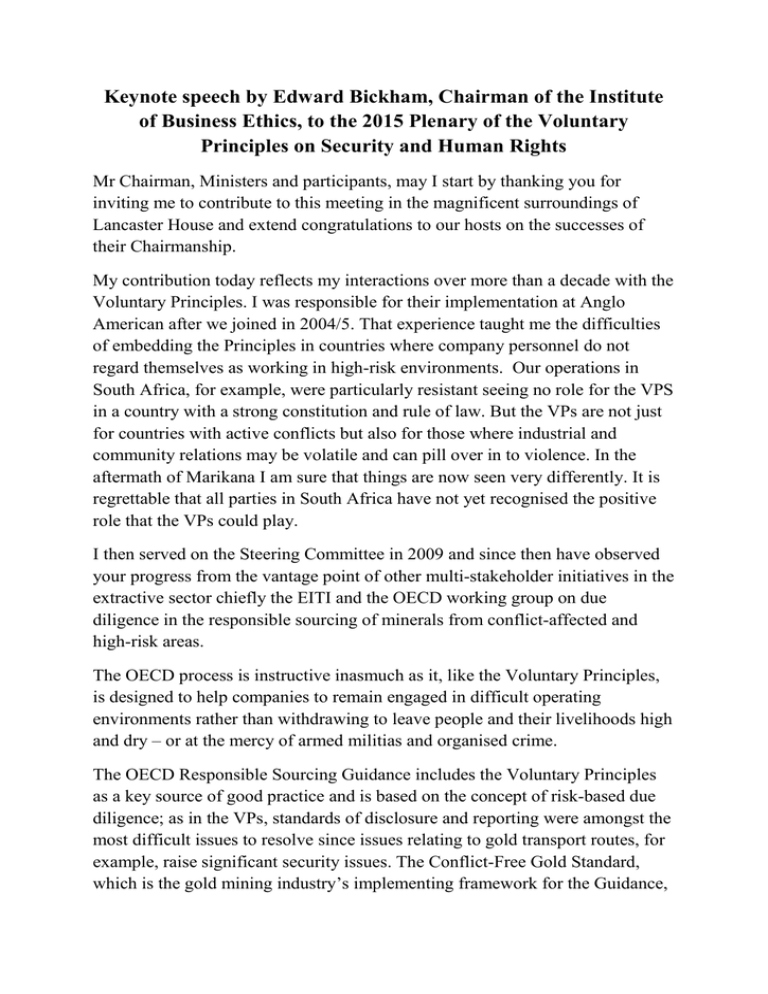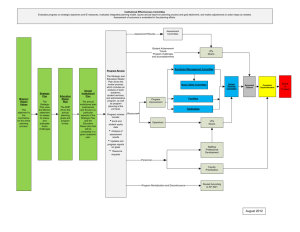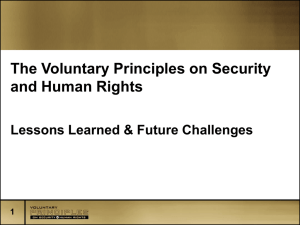Keynote speech by Edward Bickham, Chairman of the Institute
advertisement

Keynote speech by Edward Bickham, Chairman of the Institute of Business Ethics, to the 2015 Plenary of the Voluntary Principles on Security and Human Rights Mr Chairman, Ministers and participants, may I start by thanking you for inviting me to contribute to this meeting in the magnificent surroundings of Lancaster House and extend congratulations to our hosts on the successes of their Chairmanship. My contribution today reflects my interactions over more than a decade with the Voluntary Principles. I was responsible for their implementation at Anglo American after we joined in 2004/5. That experience taught me the difficulties of embedding the Principles in countries where company personnel do not regard themselves as working in high-risk environments. Our operations in South Africa, for example, were particularly resistant seeing no role for the VPS in a country with a strong constitution and rule of law. But the VPs are not just for countries with active conflicts but also for those where industrial and community relations may be volatile and can pill over in to violence. In the aftermath of Marikana I am sure that things are now seen very differently. It is regrettable that all parties in South Africa have not yet recognised the positive role that the VPs could play. I then served on the Steering Committee in 2009 and since then have observed your progress from the vantage point of other multi-stakeholder initiatives in the extractive sector chiefly the EITI and the OECD working group on due diligence in the responsible sourcing of minerals from conflict-affected and high-risk areas. The OECD process is instructive inasmuch as it, like the Voluntary Principles, is designed to help companies to remain engaged in difficult operating environments rather than withdrawing to leave people and their livelihoods high and dry – or at the mercy of armed militias and organised crime. The OECD Responsible Sourcing Guidance includes the Voluntary Principles as a key source of good practice and is based on the concept of risk-based due diligence; as in the VPs, standards of disclosure and reporting were amongst the most difficult issues to resolve since issues relating to gold transport routes, for example, raise significant security issues. The Conflict-Free Gold Standard, which is the gold mining industry’s implementing framework for the Guidance, sets out a range of expectations for companies wanting to operate responsibly in conflict-affected and high risk areas. It requires implementing companies to provide independent assurance on, inter alia, their implementation of the Voluntary Principles if they are working in a conflict zone. The OECD, by the way, has recently signed a Memorandum of Understanding with the Chinese Government on promoting responsible business conduct. The leading Chinese industry association in the mining and metals sector has just adopted a version of the Responsible Sourcing Guidance. Perhaps we should be seeking to ensure that more is also done through this mechanism to socialise the VPs with the leading Chinese extractive companies? The genesis of the VPs Back at the turn of the Century, the drafting and launch of the Voluntary Principles sought to address a lack of consensus about the roles and responsibilities of companies in managing security challenges whilst ensuring respect for the human rights of local people. Until then the area was hotly contested. The Voluntary Principles broke new ground in both process and substantive terms and showed how government, business and NGOs could work together in a focussed way to build a consensus around what constitutes good practice. The net result was that investment and litigation risks were reduced and companies had, at last solid guidance on how they should conduct themselves. Home country governments could protect their access to resources and give guidance to their companies and NGOs both showed that by engaging they could have influence, could reduce the likelihood of communities being subject to human rights abuses and could hold companies to account if they failed to live up to expectations. Each stakeholder group could advance their objectives through the process. Co-operation has, on occasions been more difficult in the Voluntary Principles than in other multi-stakeholder fora - but then the issues under discussion are arguably more sensitive. The thing that most strikes me about this process compared with the others, however, is its limited success in building trust and in sometimes showing understanding of the contribution and incentives of the other parties. There certainly was a tendency to test each other’s patience to destruction. I hope and sense that this is now behind you. At least no one seriously questions that our fundamental text is anything other than right – which after 15 years is very encouraging. A changing environment So what has happened to the external environment for our issues in the intervening years? • In the first place, the Guiding Principles arrived and I believe that the VPs have stood up well in the new environment based as they are on an holistic approach to risk assessment and due diligence and their emphasis on leverage chiming well with the Protect, Respect and Remedy framework – albeit I know that some participants believe that more work is needed on remedies. • Secondly, there is now much greater discussion and understanding of the realities and complexities of gender based violence. This has been a major issue for a number of participating companies. Indeed, the VPs may want to consider producing specific guidance on this issue in due course. • Thirdly, there is greater acceptance that extractive companies can, in the context of good governance and the implementation of best practices, be significant development actors. • Fourthly, citizens have become more demanding and assertive and mobile telephones and the internet mean that’ little local difficulties’ can rapidly become global reputational cause celebres. • Fifthly, we know much more collectively about what works in preventing corporate activities from inadvertently triggering conflict. This comes from initiatives like International Alert’s Conflict Sensitive Business Practices guide – now amazingly celebrating its tenth birthday – through to advances by many companies in how they engage with their stakeholders and seek to understand their impacts. Practices by many of the leading companies have simply been transformed over the period – and part of the credit for this must go to the NGOs who have taken risks with their peer group and worked with them. Continuing conflict Regrettably, however, recent years have seen a resurgence in the number of both inter and intra-state conflicts. According to the most recent Heidelberg Conflict Barometer, there were 45 highly violent conflicts in the world and many are in regions of relevance to extractive companies. However, our process is, in many respects in considerably better health than at the last meeting I attended five years ago. Things have genuinely moved on. • Colombia, Australia and Ghana have become involved and the number of participating companies has grown to 28; • The 2014-16 strategy created an excellent roadmap. • The agreements on the roles and responsibilities of participants from government, civil society and companies, the work on KPIs by a leadership group and the adoption of the verification frameworks are a very significant steps forward.; and • The Statement on MOUs with public security providers addresses one of the most difficult aspects of implementing the Voluntary Principles. These advances should facilitate trust building and accountability and perhaps enable the process and participants to devote still more attention to outreach, and to building greater stakeholder recognition of your work and to improving the effectiveness of implementation. Moreover, the VPs have been endorsed by a range of organisations including the IFC and the OECD and been cited in a number of government human rights action plans. Most recently, the Canadian Government’s Enhanced CSR Strategy introduced penalties for Canadian companies who do not adhere to their endorsed guidelines, including the VPs. According to the last summary report on implementation there is activity relating to the VPs in more than seventy countries – and that is just counting the work of the companies who are formally part of the process. That is a big impact on the ground. It means that in lots of places companies and their private security providers and public security forces are getting things right that they might previously have got wrong. So what could be better? To which my reply is that the VPs need a bigger tent. All three pillars need to increase their outreach. In civil society for example the continuing absence of a number of advocacy groups is regrettable. They can do much more for the causes they rightly uphold by being here. In relation to governments, although I recall much controversy about its admission, Colombia has blazed a trail and has done some absolutely exemplary things. Ghana’s accession last year was a big step forward. The news of interest from countries Angola, Tanzania, Guinea, Peru and others is encouraging. But there are many more countries where, through the engagement of host governments, issues with public security forces could be more easily resolved and issues of accountability more easily addressed. EITI was once accused by some countries as being a neo-Imperialist plot – but the lie was given to this by the enthusiastic participation of countries like Nigeria, Ghana, Liberia and Peru who took ownership of the process. I hope that the countries who have joined the meeting but have not yet reached the point of sign-up, will tell us what we collectively need to do to make the proposition more compelling for them in areas like human rights performance, reputation and attracting investment. And in relation to companies, I think there are two immediate external tasks. First, whilst I know that a lot of knowledge and experience sharing goes on between companies in this room, I believe we need to create the structures that will help to ensure that more sharing happens at country level. Secondly, I would hope that you can look at means by which companies which may not be able to afford to participate in annual meetings, can still be encouraged to implement the Voluntary Principles and have their implementation externally assured. There are some companies who may express their commitment but then, without peer pressure, do little to follow through but there are others who want to do the right thing and need our encouragement and support in so doing. Thank you for inviting me to join you. In re-engaging after some years away I have been greatly enthused and encouraged by the recent progress being made. The Voluntary Principles provide authoritative guidance to the benefit of companies, security providers, home and host country governments, NGOs and, above all, citizens who live and work around our operations. You have built – and are building - something that really matters and has a benign influence on the lives of potentially tens of thousands of citizens around the world. But, it has still to realise its full potential. I wish you well in your deliberations over the next two days.


